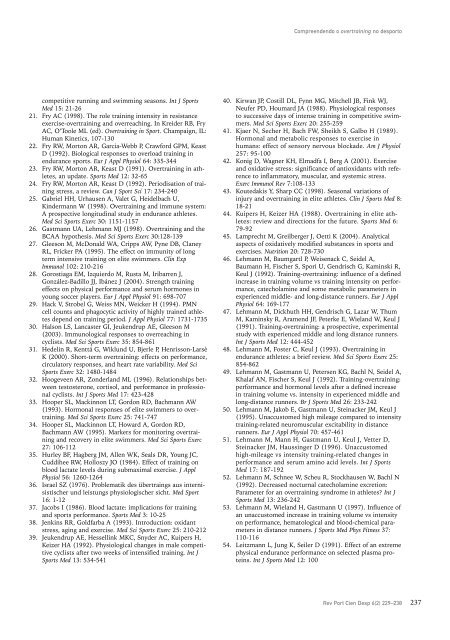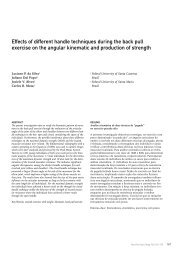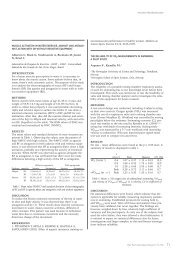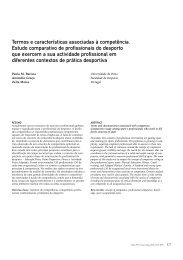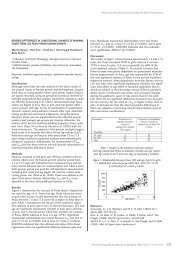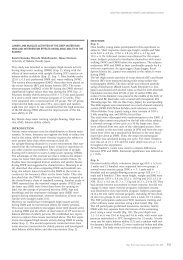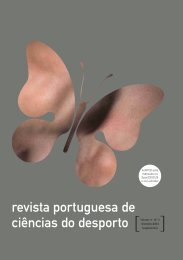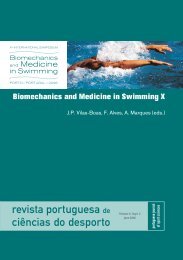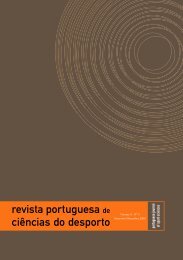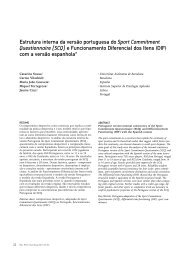download PDF - Faculdade de Desporto da Universidade do Porto
download PDF - Faculdade de Desporto da Universidade do Porto
download PDF - Faculdade de Desporto da Universidade do Porto
Create successful ePaper yourself
Turn your PDF publications into a flip-book with our unique Google optimized e-Paper software.
competitive running and swimming seasons. Int J Sports<br />
Med 15: 21-26<br />
21. Fry AC (1998). The role training intensity in resistance<br />
exercise-overtraining and overreaching. In Krei<strong>de</strong>r RB, Fry<br />
AC, O’Toole ML (ed). Overtraining in Sport. Champaign, IL:<br />
Human Kinetics, 107-130<br />
22. Fry RW, Morton AR, Garcia-Webb P, Crawford GPM, Keast<br />
D (1992). Biological responses to overload training in<br />
endurance sports. Eur J Appl Physiol 64: 335-344<br />
23. Fry RW, Morton AR, Keast D (1991). Overtraining in athletes,<br />
an up<strong>da</strong>te. Sports Med 12: 32-65<br />
24. Fry RW, Morton AR, Keast D (1992). Periodisation of training<br />
stress, a review. Can J Sport Sci 17: 234-240<br />
25. Gabriel HH, Urhausen A, Valet G, Hei<strong>de</strong>lbach U,<br />
Kin<strong>de</strong>rmann W (1998). Overtraining and immune system:<br />
A prospective longitudinal study in endurance athletes.<br />
Med Sci Sports Exerc 30: 1151-1157<br />
26. Gastmann UA, Lehmann MJ (1998). Overtraining and the<br />
BCAA hypothesis. Med Sci Sports Exerc 30:128-139<br />
27. Gleeson M, McDonald WA, Cripps AW, Pyne DB, Claney<br />
RL, Fricker PA (1995). The effect on immunity of long<br />
term intensive training on elite swimmers. Clin Exp<br />
Immunol 102: 210-216<br />
28. Gorostiaga EM, Izquier<strong>do</strong> M, Rusta M, Iribarren J,<br />
González-Badillo JJ, Ibánez J (2004). Strength training<br />
effects on physical performance and serum hormones in<br />
young soccer players. Eur J Appl Physiol 91: 698-707<br />
29. Hack V, Strobel G, Weiss MN, Weicker H (1994). PMN<br />
cell counts and phagocytic activity of highly trained athletes<br />
<strong>de</strong>pend on training period. J Appl Physiol 77: 1731-1735<br />
30. Halson LS, Lancaster GI, Jeukendrup AE, Gleeson M<br />
(2003). Immunological responses to overreaching in<br />
cyclists. Med Sci Sports Exerc 35: 854-861<br />
31. He<strong>de</strong>lin R, Kenttá G, Wiklund U, Bjerle P, Henrisson-Larsè<br />
K (2000). Short-term overtraining: effects on performance,<br />
circulatory responses, and heart rate variability. Med Sci<br />
Sports Exerc 32: 1480-1484<br />
32. Hoogeveen AR, Zon<strong>de</strong>rland ML (1996). Relationships between<br />
testosterone, cortisol, and performance in professional<br />
cyclists. Int J Sports Med 17: 423-428<br />
33. Hooper SL, Mackinnon LT, Gor<strong>do</strong>n RD, Bachmann AW<br />
(1993). Hormonal responses of elite swimmers to overtraining.<br />
Med Sci Sports Exerc 25: 741-747<br />
34. Hooper SL, Mackinnon LT, Howard A, Gor<strong>do</strong>n RD,<br />
Bachmann AW (1995). Markers for monitoring overtraining<br />
and recovery in elite swimmers. Med Sci Sports Exerc<br />
27: 106-112<br />
35. Hurley BF, Hagberg JM, Allen WK, Seals DR, Young JC,<br />
Cuddihee RW, Holloszy JO (1984). Effect of training on<br />
blood lactate levels during submaximal exercise. J Appl<br />
Physiol 56: 1260-1264<br />
36. Israel SZ (1976). Problematik <strong>de</strong>s übertraings aus internisistischer<br />
und leistungs physiologischer sicht. Med Sport<br />
16: 1-12<br />
37. Jacobs I (1986). Blood lactate: implications for training<br />
and sports performance. Sports Med 3: 10-25<br />
38. Jenkins RR, Goldfarba A (1993). Introduction: oxi<strong>da</strong>nt<br />
stress, aging and exercise. Med Sci Sports Exerc 25: 210-212<br />
39. Jeukendrup AE, Hessellink MKC, Sny<strong>de</strong>r AC, Kuipers H,<br />
Keizer HA (1992). Physiological changes in male competitive<br />
cyclists after two weeks of intensified training. Int J<br />
Sports Med 13: 534-541<br />
Compreen<strong>de</strong>n<strong>do</strong> o overtraining no <strong>de</strong>sporto<br />
40. Kirwan JP, Costill DL, Fynn MG, Mitchell JB, Fink WJ,<br />
Neufer PD, Houmard JA (1988). Physiological responses<br />
to successive <strong>da</strong>ys of intense training in competitive swimmers.<br />
Med Sci Sports Exerc 20: 255-259<br />
41. Kjaer N, Secher H, Bach FW, Sheikh S, Galbo H (1989).<br />
Hormonal and metabolic responses to exercise in<br />
humans: effect of sensory nervous blocka<strong>de</strong>. Am J Physiol<br />
257: 95-100<br />
42. Konig D, Wagner KH, Elmadfa I, Berg A (2001). Exercise<br />
and oxi<strong>da</strong>tive stress: significance of antioxi<strong>da</strong>nts with reference<br />
to inflammatory, muscular, and systemic stress.<br />
Exerc Immunol Rev 7:108-133<br />
43. Koute<strong>da</strong>kis Y, Sharp CC (1998). Seasonal variations of<br />
injury and overtraining in elite athletes. Clin J Sports Med 8:<br />
18-21<br />
44. Kuipers H, Keizer HA (1988). Overtraining in elite athletes:<br />
review and directions for the future. Sports Med 6:<br />
79-92<br />
45. Lamprecht M, Greilberger J, Oetti K (2004). Analytical<br />
aspects of oxi<strong>da</strong>tively modified substances in sports and<br />
exercises. Nutrition 20: 728-730<br />
46. Lehmann M, Baumgartl P, Weisenack C, Sei<strong>de</strong>l A,<br />
Baumann H, Fischer S, Spori U, Gendrisch G, Kaminski R,<br />
Keul J (1992). Training-overtraining: influence of a <strong>de</strong>fined<br />
increase in training volume vs training intensity on performance,<br />
catecholamine and some metabolic parameters in<br />
experienced middle- and long-distance runners. Eur J Appl<br />
Physiol 64: 169-177<br />
47. Lehmann M, Dickhuth HH, Gendrisch G, Lazar W, Thum<br />
M, Kaminsky R, Aramend JF, Peterke E, Wieland W, Keul J<br />
(1991). Training-overtraining: a prospective, experimental<br />
study with experienced middle and long distance runners.<br />
Int J Sports Med 12: 444-452<br />
48. Lehmann M, Foster C, Keul J (1993). Overtraining in<br />
endurance athletes: a brief review. Med Sci Sports Exerc 25:<br />
854-862<br />
49. Lehmann M, Gastmann U, Petersen KG, Bachl N, Sei<strong>de</strong>l A,<br />
Khalaf AN, Fischer S, Keul J (1992). Training-overtraining:<br />
performance and hormonal levels after a <strong>de</strong>fined increase<br />
in training volume vs. intensity in experienced middle and<br />
long-distance runners. Br J Sports Med 26: 233-242<br />
50. Lehmann M, Jakob E, Gastmann U, Steinacker JM, Keul J<br />
(1995). Unaccustomed high mileage compared to intensity<br />
training-related neuromuscular excitability in distance<br />
runners. Eur J Appl Physiol 70: 457-461<br />
51. Lehmann M, Mann H, Gastmann U, Keul J, Vetter D,<br />
Steinacker JM, Haussinger D (1996). Unaccustomed<br />
high-mileage vs intensity training-related changes in<br />
performance and serum amino acid levels. Int J Sports<br />
Med 17: 187-192<br />
52. Lehmann M, Schnee W, Scheu R, Stockhausen W, Bachl N<br />
(1992). Decreased nocturnal catecholamine excretion:<br />
Parameter for an overtraining syndrome in athletes? Int J<br />
Sports Med 13: 236-242<br />
53. Lehmann M, Wieland H, Gastmann U (1997). Influence of<br />
an unaccustomed increase in training volume vs intensity<br />
on performance, hematological and blood-chemical parameters<br />
in distance runners. J Sports Med Phys Fitness 37:<br />
110-116<br />
54. Leitzmann L, Jung K, Seiler D (1991). Effect of an extreme<br />
physical endurance performance on selected plasma proteins.<br />
Int J Sports Med 12: 100<br />
Rev Port Cien Desp 6(2) 229–238 237


